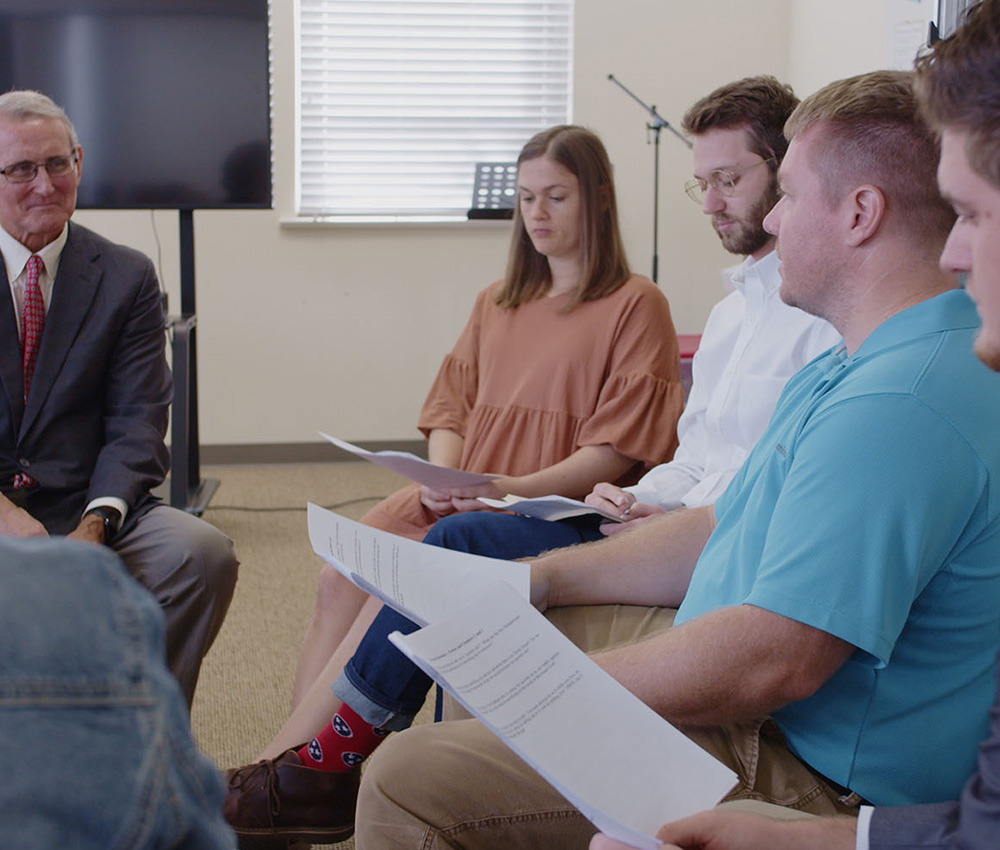Adults & Families

Small Groups
Goal: Fellowship
In Acts 2:42 we read that the early Christian church was “devoted to the fellowship,” which is to say they were devoted to one another. This was a genuine commitment to one another that shaped the way these early Christians lived their lives. While our cultural context is different than that of the first century, we believe that the call of the gospel on our lives remains the same. Small Groups at Holy Trinity Presbyterian Church provide a context for building deep and lasting relationships as we pray, study the Bible, and share the joys and sorrows of life together.
Each of our Elders leads a Small Group for devotion and prayer around God’s Word 1-2 times each month, and we also have a Young Adult Small Group that meets each month.

Bible Studies
At Holy Trinity
Spring 2026 Studies:
Our Spring Bible studies will be held on Wednesdays at the church. We’ll begin with a fellowship meal, followed by a lesson and discussion. See below for meeting times. Contact Sarah Fisher with any questions.
Beginning January 14th, 2026
Fellowship Dinner, 6:00 pm
Women’s Study – Study of the Book of Acts
Wednesdays, 10:00 am & 6:30 pm
Men’s Study – Study of the Book of Acts
Wednesdays, 6:30 pm
Childcare is provided for all sessions.
Other Studies:
College Hill Bible Study
Tuesdays, 6:30–7:30 am Meets via Zoom presently.
The men are currently studying the book of Matthew.
Young Men’s Discipleship Group
Fridays, 6:30–7:30 am Meets at Wink Hall’s home. Contact wleitner@htpctampa.org for more information.
Young Women’s Discipleship Group
Wednesdays, 6:30–7:30 am Meets at Julie Eudaly’s home. Contact ethomas@htpctampa.org for more information.

Family Ministry
Foundational Biblical Convictions for Family Ministry
This blessing comes with great responsibility because the Lord desires godly offspring (Mal 3:15; Gen 18:18-19).
(Deut 6:4-25) Parents are charged by God to raise their children in the knowledge, fear, and admonition of the Lord.
God gives responsibilities to both parents and children (Gen 17:7, 27; Acts 2:38-39; 1 Cor 7:14).
Both the Old and New Covenants include children in the promises, practices, and public assemblies of the people of God (Ps 103:17-18; Acts 2:39; Deut 6:6-7; Matt 19:14; Neh 8:2; Eph 6:1).
A part of God’s instruction concerns their duties as parents (Eph 6:1-4; 1 Peter 3:1-7). The church also has an obligation to disciple parents in their faith. This includes assisting them in the practical fulfillment of their pastoral duties.
A part of God’s instruction concerns their duties as children of the covenant (Eph 6:1-4; Prov 1:8).
The church has an obligation to disciple children in a way relevant and applicable to their age. The church must also assist them in the practical fulfillment of their duties.
They have unique ministry needs which the Scriptures address (Titus 2:5-6).
It is important for the church to remember that children share in all of its rights and privileges. This fact should be appropriately reflected in the life of the church.
Since children are a part of the larger church body, they are dependent upon it. They should not be unduly separated from the rest of the body (1 Cor 12:23-27). Just like men and women are subsets with separate meetings, but are still part of the whole.
They have the same fundamental sin problems and gospel solutions as any other member of the church. Furthermore, this redemption is applied to children in the same manner as it is to adults (Acts 2:41-42).
Non-Christian children in the broader community are a missiological people-group to which the church is called to spread the gospel (Matt 28:19-20).
What This Looks Like in Practice
A common concern expressed by parents is “my children do not seem to be getting anything out of our church services.” Children are squirming in the pew, coloring, and distracting those around them.
However, we must “live by faith, not by sight.” While it appears to us that our children are profiting little from church gatherings, there are two biblical truths that we must keep in view:
First, ordinary means grow children.
Worship, prayer, sacraments, and fellowship are the primary ways any Christian grows. We call these the “ordinary means of grace” (Acts 2:42).
The Bible shows us that these ordinary means are for everyone, not just adults. For example, children are always assumed to be present in public worship (Neh 8:2; Eph 6:1).
We must believe that God will be faithful to use these means to grow our children through them as he has promised to do.
Second, our goals are long term.
We must not be short-sighted in our evaluation of our children’s growth.
Biblically, the measuring rod of success is “trans-generational.” We do not get the report card on whether or not our ministry is “working” for our children, until we see whether or not they and their children after them continue in the faith (Ps 103:17).
Building solid Christians is a life-long project that cannot be measured by how well our children seem to be paying attention in a given service. More is caught than taught.
The long-term impact of children being involved in a covenant community where they see adults worshipping, praying, and studying the word cannot be underestimated.
At HTPC we firmly believe that this is the God-ordained pattern for bringing up our children in the nurture and admonition of the Lord. We believe by faith that those brought up in this way will not depart from it when they are older (Prov 22:6).